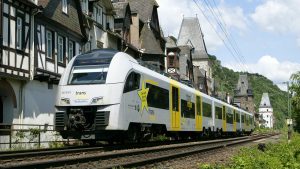 The Dutch investment group APG has acquired 41.1% shares in rolling stock leasing company Alpha Trains, from Arcus European Infrastructure Fund 1.
The Dutch investment group APG has acquired 41.1% shares in rolling stock leasing company Alpha Trains, from Arcus European Infrastructure Fund 1.
“The investment in Alpha Trains Group perfectly fits our investment strategy: Alpha Trains’ fleet of mostly electric trains and locomotives promotes sustainable, low carbon mass transport within Europe while also offering access to a long-term business model with strong growth and resilient cash flows,” Peter Branner, CIO of APG, said.
The Alpha Trains portfolio consists of more than 800 passenger trains and locomotives on lease across Continental Europe including assets in procurement, on lease across Continental Europe where it is the market leader amongst the privately-owned rolling stock lessors. The majority of the fleet is electric, making a significant contribution to the decarbonisation of European transport sector.
Alpha Trains has an experience of 20 years on rolling stock leasing market, and its fleet is used by public and private operators in 17 European countries. The company has more than 363 diesel and electric locomotives, with a range of power classes from 1,100 to 6,400 kW. They are certified in 14 European countries. Alpha Trains owns 432 passenger trains. They are manufactured by Stadler (Flirt, Flirt 3 and Kiss EMUs and Regio-Shuttle RS1 DMUs), by Alstom (Coradia Continenatal EMUs and Coradia Lint DMUs), by Siemens Mobility (Desiro ML EMUs, Desiro DMUs) and by Bombardier (Talent DMUs and Talent 2 EMUs).
Alpha Trains’ shareholders are Arcus managed funds, AMP Capital and Public Sector Pension Investment Board (PSP Investment).
APG manages EUR 528 billion in pension assets for the pension funds in different sectors. The company has 3,000 employees and works for approximately 21,000 employers. It has offices in Amsterdam, Heerlen, Brussels, New York and Hong Kong. APG has been an active infrastructure investor since 2004, investing approximately EUR 14 billion to date and managing 32 direct stakes in portfolio companies. APG’s investments include assets within energy and utilities, telecommunications, and transport infrastructure.
Share on:



